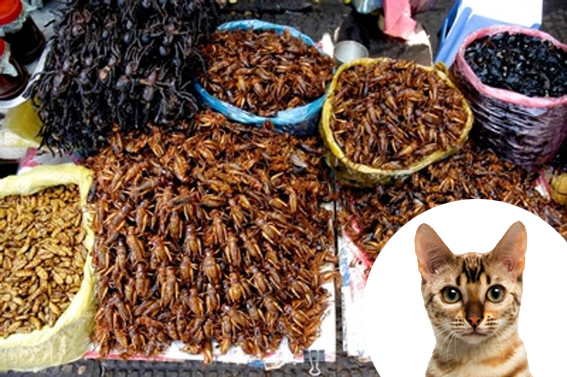INSECTS AS A DIET FOR OUR CATS
- Details
- Category: Diet
- Hits: 415

The "Novel Food", foods made with insects could be an excellent and valid alternative to the traditional diet produced by breeding livestock and poultry, both for important ethical reasons and for problems related to eco-sustainability.
Insects will be part of the diet of the future, for both humans and animals, and farms will grow that will provide an important source of protein.
Already in some parts of Europe such as France, Belgium and the Netherlands, they have started the project to be able to offer these new products to our pets as soon as possible. Monoproteic foods based on maggot meal have already arrived in Italy.
But why choose insects as food for our pets?
Let's see together 10 excellent reasons to direct us towards this new path.
1) It is a hypoallergenic food. Not being the main diet of our cat, the animal is not yet saturated with these proteins. In addition, insects are a more genuine food than poultry filled with antibiotics, hormones and various medicines.
2) For ecological reasons. Boundless hectares are devoted to cattle breeding and, in many countries, intensive farming that exploits and tortures millions of animals and has become unsustainable for the world. While insects, in addition to taking up little space for their breeding, produce little pollution compared to livestock and poultry and there is a huge saving in consumption.
3) Insects are ideal for the growth and maintenance of our 4-legged friend because the proteins of insects are perfectly assimilated by their metabolism. Insects provide high quality protein and nutrients comparable to those provided by meat and fish. In addition, many insect species have a high quantity of fatty acids and are rich in fiber and micronutrients such as copper, iron, magnesium, manganese, phosphorus, selenium and zinc.
4) Convenience and optimization in production. Insects convert 2 kg of food into 1 kg of mass, cattle 8 kg of food for 1 kg of mass. 4 times as much
5) The breeding of insects produces greenhouse gases 10 to 100 times lower than that of conventional livestock.
6) Insects can feed on organic waste such as human food and feces remnants, compost and animal sewage, and can turn them into high quality protein (this practice is allowed in some countries, but prohibited in the European Union).
7) Insects use less water than conventional livestock.
8) Insects present a low risk of transmission of zoonoses (diseases transmitted from animals to humans) such as H1Nr1 (avian flu) or Bse (mad cow disease). However, European legislation prohibits the administration to ruminants of feed containing insects or transformed proteins derived from them.
9) Production is cheaper and pet food could have low prices and very high quality.
10) Insects feed on waste from the food industry, so they are environmentally friendly and reduce waste.
Insects are certainly a valid alternative to the classic diet for our friends. Personally, I wait for the production of the proteins in the test tube. A dream would be to be able to feed our cats without exploiting any other form of life. For us humans it is different, we can do without animal proteins, replacing them to have a balanced diet, but a cat by its nature is only carnivorous and needs protein for its metabolic system.












